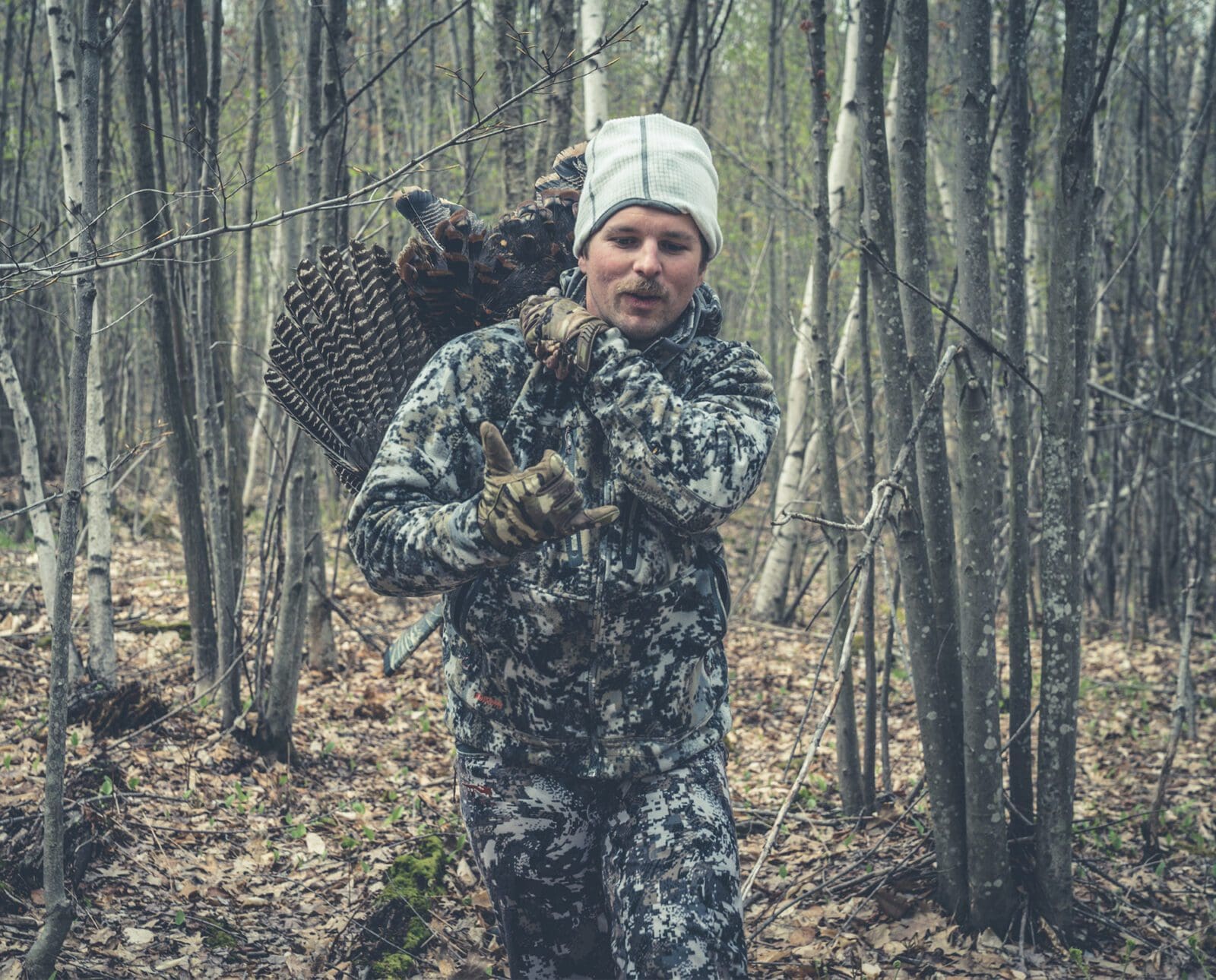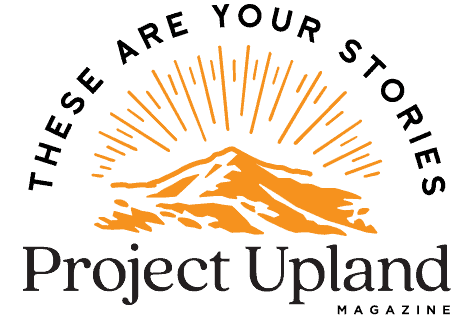Home » Turkey Hunting » The Oxymoron of Success and Failure in Turkey Hunting
The Oxymoron of Success and Failure in Turkey Hunting

A.J. DeRosa, founder of Project Upland, is a New England…
Has someone truly experienced the emotions of success in hunting if they have not also experienced failure?
We sprinted along the backside of the mountain trying to get to an area with a log cutting cresting the top. The bird had already gobbled multiple times at my first set of yelps. Outwardly, I was patient enough not to call again, but inside I was screaming to keep the calling going; the knowledge to call less and the childish sense of exciting encounters at odds with each other.
Ezra and I had become friends when I first moved to town some years before.
“I have shot jakes but not a Tom,” he had said.
“Well, I would love to call in a bird for you!” was my automatic reply.
When we finally connected this past season we had got our asses handed to us for a couple of days, so I decided to try an area I had originally hiked 4 miles to a couple of years before and shot a bird. I had not been back since. I did, however, find a logging road to cut that distance by about 90 percent. “Work smarter, not harder,” is a great descriptor in this case.
Ezra sat with a rock wall in front of him, me 15 yards behind him with my back to another rock wall. The bird kept gobbling and I kept trying to move him, but despite all my attempts he was not leaving his strut zone—too far off, and no way to cut the distance. In response to the challenge, I escalated my calling to sound like a territorial hen before I would go to a personal favorite method of retreating further away from the shooter hoping the lovesick bird would be interested in moving a bit closer as my calls got further.
I discovered the territorial hen calling concept many years before and was lucky enough to trick a few birds in the same season with it. But I also quickly discovered territorial hen calls bring in hens, which often can ruin a hunt. Try as I may, my subpar calling is not going to outdo a live bird. But I do love trying.
READ: The Fighting Hens – A Deadly Turkey Calling Tactic
I heard a sound to my left and looked to see a hen stepping over the rock wall not 10 yards away. We made eye contact and my heart sunk. The bird saw me, started walking faster towards the Tom, and began her warning clucks. We were busted.
I have been beaten by more turkeys than I can remember, and some of those defeats were my most rewarding and memorable hunts—turkeys that made you feel like it would surely be a filled-out tag, only to crush your dreams of success in what is a seemingly meaningless transgression. That sense of defeat, the humbling by a bird that, in theory, is not as smart as you, is such a beautiful human experience. That turkey provides you with the endless daydreams of running through the hunt again and again asking, “Where did I go wrong,” and, “If I had only done this.”
It’s far better use of brainwaves than on other things in modern society.
There is a laundry list of reasons I love turkey hunting: It’s something to hunt in the spring; a way to find new grouse covers by listening for drumming birds; the ability to interact with an animal through calling; watching the spring bring the woods to life with the smell of that air and the melting of snow after a long winter. Eating turkeys is great, too, and your heart racing as the ground vibrates with their gobble when they are on top of you is a special feeling that you will always strive for. But it is the juxtaposition between success and failure that makes turkey hunting truly special.
The dichotomy of success and failure in turkey hunting
Hunting what is hard should make you fall in love with hunting. If you used the cheat code for extra lives in Contra to beat it as a kid, it was not nearly as rewarding as if you had beat it without it and you weren’t nearly as cool—it was the 80s after all. The sense of accomplishment comes with failure; it is a marker for success. Without one, the other has no measure. More recently the idea of turkey fanning has rekindled this discussion among our community.
Success, when experienced right, is anticlimactic; in fact, can you really feel the rewards of turkey hunting if you haven’t been beaten? You can feel something, but it’s not the same feeling of the turkeys winning day after day to somehow pull it together when all seems the most impossible. That feeling—against the rawness of being owned by a wild animal—is why I love turkey hunting.
I shot my first turkey 20 years ago. We had been at it for days, multiple birds busting my amateur ass and my mentor was patient.
“I just love hearing them holler,” Jose would say.
We hopped from spot to spot in an area that most would know in the rest of the world as Old Salem in Massachusetts, home to the Salem Witch Trials. There was heavy pressure, there weren’t many places to hunt, and it was very much a hit-or-miss proposition. But even before I shot my first bird, I was hooked.
My father had never hunted turkeys—the season did not exist in his younger days—and I could almost not contain myself in getting him out next season. By that time, I could call decent enough with a slate to work a bird. Although my errors were frequent, it didn’t matter because it was just so captivating. Something about interacting with wild game in such a direct fashion pulls you to it. My father shot his first bird on our first outing, and I was bursting at the seams with excitement. He was hooked but had not gotten a true taste for the work put into turkeys.
READ: Is Bad Calling Good Enough to Hunt Turkeys?
The following year he did fill his tags, but we worked for it. There were multiple close encounters on what felt like easy scenarios, only to have the turkey gods slap us back to reality. The encounters that panned out, well, they were crazy hunts in situations that felt impossible. I’m giddy remembering that whole season, failures and all.
The delicate balance of success and failure in turkey hunting
Ezra turned around to make eye contact with me after he heard the hen and saw it so close, realizing what had happened. I mouthed, “Stay there,” and did what I always try to do, take lessons from the birds. I mimicked every call that hen made to the best I could, starting with her warning clucks that eventually descended into agitated calls as she second-guessed what she had seen up at that rock wall. It all seemed like a ridiculous idea before I started, intentionally making warning clucks, but we were running out of time, bold and stupid on a razor’s edge.
READ: How Fall Turkeys Can Improve Your Calling Skills
As if the turkey gods had known we had paid many tolls that week, sure enough, she decided to come back. Now to reiterate, I had no idea what I was doing outside the desperation of the final day of the season. What did I have to lose?
“Warning clucks as a method” — not sure I can put my stamp of approval on that article. This one is more like, “Golden Horseshoes in Special Places for Turkey Hunting Desperation.” Yet, somehow, about 30 minutes after that hen busted us, Ezra shot his first Tom, brought in by my arch-nemesis, the hen.
Arch-nemesis sounds rough, but after years of being beat by hens and Toms pulled off after working them for hours, they are a variable that owns a special place in turkey hunting. They make the challenge better because the challenge is what makes turkey hunting special; all those unknown variables that make failure a majority and success a minority. If you do not know what it’s like to get owned by a hen, then you just need to hunt turkeys more. It’s not a bad thing.
Each spring I end up with some roosting Toms on my property. They strut in front of my office window, reminding me how late the New Hampshire season is. Their presence gets them a hard pass come opening week. The idea of just shooting a bird on my property would negate so many of those variables that often transcend into failure in the pursuit of turkeys.
I long for that lone, distant gobble after hours of walking trails without a single reply. The bird that comes in like he is on a fishing line after you have spent hours down and out on yourself. That bird that shakes the ground underneath you because it’s so close, but, no matter how hard you try, you just cannot get that shot. That hen that pulls a Tom away after you decided not to shoot until it was closer only to laugh at yourself for waiting. The look on a new hunter’s face after they worked for it, having gone through a wide range of emotions and kept with it.
The path of most hunters will evolve. Failures become the foundation stones and we build on that, advancing our journey in humanity’s oldest tradition. It is not a juxtaposition, but an oxymoron to think we can experience success without failure. To lose that narrative degrades what hunting is, and turkey hunting is perhaps one of the easiest ways to experience that important journey.
Remember that social media is a curation of only a few moments and not a true look at reality. The real stories, the best stories, are often not the ones that result in a pretty photo. They are enjoyed best in our oldest media form, sitting around a campfire and passed on through oral traditions, where the glory of the one that got away is celebrated. It’s a place where we can remember the failures that inspire our progress.
A.J. DeRosa, founder of Project Upland, is a New England native with over 35 years of hunting experience across three continents. His passion for upland birds and side-by-side shotguns has taken him around the world, uncovering the stories of people and places connected to the uplands. First published in 2004, he wrote The Urban Deer Complex in 2014 and soon discovered a love for filmmaking, which led to the award-winning Project Upland film series. A.J.'s dedication to wildlife drives his advocacy for conservation policy and habitat funding at both federal and state levels. He serves as Vice Chair of the New Hampshire Fish & Game Commission, giving back to his community. You can often find A.J. and his Wirehaired Pointing Griffon, Grim, hunting in the mountains of New England—or wherever the birds lead them.




Those alarm putts you referred to weren’t alarm putts . They were clucks in turkey talk she was saying where you at I’m here . Believe me an alarm putt would’ve sent them running.